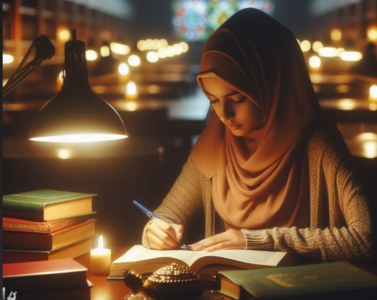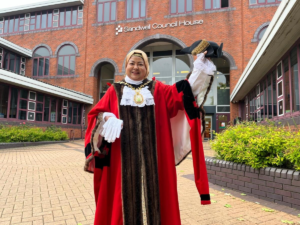10 Female Muslim scholars and their contribution to the Society.
The history of Islam is adorned with the wisdom, intellect, and resilience of countless women who emerged as scholars, educators, and thinkers but not many people are aware of the female scholars.
Many Female scholarship goes unrecognised and many female scholars are under-valued. The accomplishments of Muslim women scholars are often downplayed or overshadowed, contributing to an unfortunate trend of undervaluing their intellectual pursuits. This undervaluation extends beyond academia to impact society at large, limiting the full appreciation of the diverse talents and perspectives these women bring to the table.
There are numerous instances where the contributions of Muslim women scholars have been overlooked. From pioneering scientists and mathematicians to influential poets and theologians, their impact reverberates through history, yet their names remain obscured.
Also read- 7 Reasons why we need more Female Scholars in Islam

In this article we celebrate 10 Female Muslim scholars and their contribution to the Society.
Unveiling the Brilliance: 10 Female Muslim Scholars

- Khadijah bint Khuwaylid (555-619 CE):
- The first wife of Prophet Muhammad (peace be upon him) and a prominent businesswoman in pre-Islamic Arabia.
- Known for her wisdom, support, and dedication to spreading the message of Islam during its early years.
- Aisha bint Abi Bakr (613-678 CE):
- Renowned for her vast knowledge of Islamic jurisprudence, theology, and poetry.
- Played a crucial role in the preservation and transmission of Hadith, making her a key figure in Islamic scholarship.
- Fatima al-Fihri (800-880 CE):
- Founder of the world’s oldest existing university, the University of Al Quaraouiyine in Fez, Morocco.
- Established an institution that prioritized religious studies while encompassing a broad range of subjects, including science, mathematics, and humanities.
- Rabia al-Basri (717-801 CE):
- An early Islamic mystic and poet known for her profound spiritual insights and devotion.
- Explored themes of divine love, detachment from worldly possessions, and the inner journey towards Allah through her poetry.
- Fatima al-Juzdani (12th century):
- Highly respected for her expertise in Islamic law, specializing in hadith and jurisprudence.
- Authored works on jurisprudence that are still studied today, reflecting the depth of her intellectual contributions.
- Mariam al-Ijliya (11th century):
- An expert in Islamic theology and a prolific writer on religious subjects.
- Contributed significantly to the development of Islamic thought through her scholarly writings, particularly in the realm of theology.
- Shuhda bint Ahmad (10th century):
- A renowned physician and scholar who specialized in the field of medicine.
- Wrote extensively on medical topics, showcasing a high level of expertise and contributing to the advancement of medical knowledge in the Islamic world.
- Nana Asma’u bint Usman dan Fodio (1793-1864):
- A prominent 19th-century scholar and poet from West Africa.
- Advocated for education, particularly for women, and composed numerous poems addressing social, moral, and political issues.
- Sayyida Nafisa (c. 762-824 CE):
- Descendant of Prophet Muhammad (peace be upon him) and a revered figure in Islamic history.
- A very People know that female Scholar and the teacher of Imam Shafi was Sayyedina Nafisa,. Her full name was As-Sayyidah Nafīsah bint Amīr al-Muʾminīn Al-Ḥasan al-Anwar ibn Zayd al-Ablaj ibn Al-Hasan ibn ʿAlī ibn Abī Ṭālib al-ʿAlawiyyah al-Ḥasaniyyah.
- She was a famous Female scholar in Egypt who was born in 145 Ah and she died on 208 AH. She was ahle bayt: a descendent of Rasul Allah Sallahu Alaihe wa sallam. She was born in Mecca in about 762 CE, to Al-Hasan al-Anwar the son of Zayd al-Ablaj, son of Al-Hasan the grandson of Muhammad Sallalahu alaihe wa Sallam. She spent her later life in Cairo, where there is a mosque bearing her name.
- Gained recognition as a scholar and teacher, specializing in the study of Hadith and Islamic jurisprudence.
- Sitt al-Wuzara Fatima al-Samarqandi (12th century):
- An influential scholar who contributed significantly to Islamic theology and philosophy during the Seljuk era.
- Actively engaged in debates and discussions, challenging and contributing to the intellectual discourse.
The echoes of these remarkable women resonate through time, urging us to recognize the potential that lies within every woman who aspires to contribute to the intellectual and cultural tapestry of our world.

If you have a daughter in your home, inspire her with this book on female scjholars, You can get it from Amazon
Share this article-10 Female Muslim scholars and their contribution to the Society.
Discover more from Islam Hashtag
Subscribe to get the latest posts sent to your email.




